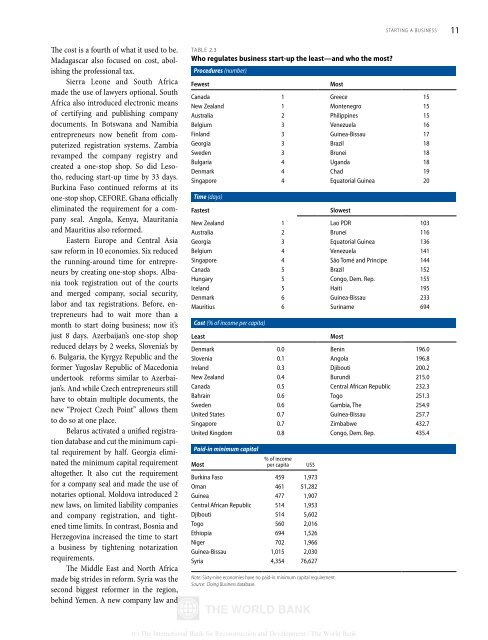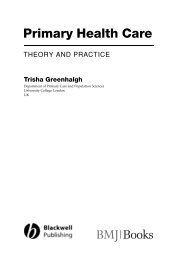7%Cut or simplified postregistration proceduresNote: A reform may include several reform features.10 Doing Business <strong>2009</strong>Source: Doing Business database.FIGURE 2.3Starting a business in Azerbaijangets faster and cheaperTime and cost to start a business2004Time (days)1220Cost(% of income per capita)14.402005 2006 2007 200811412.3Source: Doing Business database.529.3Time cutby 87%Cost cutby 77%306.9163.229%. 3 One reason for these large effectsmay be that reducing entry costsincreases entry pressure, pushing firmswith lower productivity out of the market.Indeed, a study on business entryin Mexico finds that competition fromnew entrants lowered prices by 1% andreduced the income of incumbent businessesby 3.5%. 4Simpler and faster business entrymakes it easier for workers and capitalto move across sectors when economiesexperience economic shocks. A recentstudy of 28 sectors in 55 countries comparessectoral employment reallocationin the 1980s and 1990s. The finding: reallocationis smoother in countries where ittakes fewer days to start a business. 5 Thisfinding is confirmed by many studies onthe effect of entry regulation in economiesopening their product markets to trade. 6The explanation is simple: with high fixedcosts of entry, firms cannot easily moveinto the industries benefiting the mostfrom trade openness. This friction reducesthe value of greater openness.Recognizing such benefits, economiesaround the world have been developinginnovative solutions to ease theentry of new firms into the market. Asone company registrar put it, “At the endof the day, we all have the same goal.”Yet as Doing Business shows, companyregistration is often only one pieceof the puzzle. In many economies entrepreneurshave to visit at least 7 agenciesbefore they can get down to business.The most efficient economies focuson creating a single interface betweengovernment and entrepreneur to takecare of all necessary registrations andnotifications, mainly commercial andtax registration. Entrepreneurs in NewZealand, for example, have to file all necessaryinformation only once—becauseagencies are linked through a unifieddatabase. There is no minimum capitalrequirement. And no judge has to approvethe creation of a company.Who reformed in 2007/08?In 2007/08, 49 economies made it easierto start a business—more reforms thanin any previous year (table 2.2). Onehighlight of the reforms: entrepreneursin Canada and New Zealand can nowstart a business with a single onlineprocedure.Yemen reformed business start-upthe most. In 2007 it had the second largestminimum capital requirement in theworld at $15,225 (2,003% of income percapita). This is now gone, reduced tozero. That’s not all. Yemen also activatedits one-stop shop, making it possible tocomplete all steps—from reserving thecompany name to obtaining a license forincorporation to announcing the company’sformation—in a single location.It made it easier to obtain a license fromthe municipality and to register with thechamber of commerce and the tax office.And it publicized the fact that a companyseal is not mandatory. The reforms reducedthe number of procedures to starta business by 5, and the time by 50 days.Slovenia was the runner-up in businessstart-up reforms. It simplified businessregistration by introducing a singleaccess point, making company informationavailable online and eliminatingcourt fees and the requirement to registerat the statistical office. The changesreduced the procedures by 4, the time by41 days and the cost by 8.4% of incomeper capita.Senegal is among the 14 economiesthat made Africa the leading regionin start-up reforms. Senegal’s one-stopshop became fully operational, merging7 start-up procedures into 1. Start-uptime fell from 58 days to 8. Liberia toostreamlined business registration, cutting3 months from the time. Businessescan now start in less than 1 month. Liberiaalso made the process more affordable,making the use of lawyers optional.Table 2.2Simplifying registration formalities—the most popular reform feature in 2007/08Simplified other registration formalities(seal, publication, notary, inspection,other requirements)Created or improved one-stop shopIntroduced or improved onlineregistration proceduresAbolished or reduced minimum capitalrequirementCut or simplified postregistration proceduresSource: Doing Business database.Bangladesh, Botswana, Bulgaria, Costa Rica,El Salvador, Georgia, Ghana, Hungary, Kenya, KyrgyzRepublic, Liberia, former Yugoslav Republic ofMacedonia, Moldova, Namibia, Saudi Arabia, Syria,YemenAlbania, Angola, Azerbaijan, Belarus, Bulgaria, CzechRepublic, Italy, Lebanon, Lesotho, former YugoslavRepublic of Macedonia, Oman, Senegal, Slovakia,Slovenia, Yemen, ZambiaBulgaria, Canada, Colombia, Dominican Republic,Hungary, Italy, former Yugoslav Republic ofMacedonia, Malaysia, Mauritius, New Zealand,Panama, Senegal, SingaporeBelarus, Egypt, El Salvador, Georgia, Greece,Hungary, Jordan, Tunisia, Uruguay, YemenColombia, Madagascar, Mauritania, Sierra Leone,South Africa, Tonga, West Bank and Gaza(c) The International Bank for Reconstruction and Development / The World Bank
STARTING A <strong>BUSINESS</strong> 11The cost is a fourth of what it used to be.Madagascar also focused on cost, abolishingthe professional tax.Sierra Leone and South Africamade the use of lawyers optional. SouthAfrica also introduced electronic meansof certifying and publishing companydocuments. In Botswana and Namibiaentrepreneurs now benefit from computerizedregistration systems. Zambiarevamped the company registry andcreated a one-stop shop. So did Lesotho,reducing start-up time by 33 days.Burkina Faso continued reforms at itsone-stop shop, CEFORE. Ghana officiallyeliminated the requirement for a companyseal. Angola, Kenya, Mauritaniaand Mauritius also reformed.Eastern Europe and Central Asiasaw reform in 10 economies. Six reducedthe running-around time for entrepreneursby creating one-stop shops. Albaniatook registration out of the courtsand merged company, social security,labor and tax registrations. Before, entrepreneurshad to wait more than amonth to start doing business; now it’sjust 8 days. Azerbaijan’s one-stop shopreduced delays by 2 weeks, Slovenia’s by6. Bulgaria, the Kyrgyz Republic and theformer Yugoslav Republic of Macedoniaundertook reforms similar to Azerbaijan’s.And while Czech entrepreneurs stillhave to obtain multiple documents, thenew “Project Czech Point” allows themto do so at one place.Belarus activated a unified registrationdatabase and cut the minimum capitalrequirement by half. Georgia eliminatedthe minimum capital requirementaltogether. It also cut the requirementfor a company seal and made the use ofnotaries optional. Moldova introduced 2new laws, on limited liability companiesand company registration, and tightenedtime limits. In contrast, Bosnia andHerzegovina increased the time to starta business by tightening notarizationrequirements.The Middle East and North Africamade big strides in reform. Syria was thesecond biggest reformer in the region,behind Yemen. A new company law andTable 2.3Who regulates business start-up the least—and who the most?Procedures (number)FewestMostCanada 1 Greece 15New Zealand 1 Montenegro 15Australia 2 <strong>Ph</strong>ilippines 15Belgium 3 Venezuela 16Finland 3 Guinea-Bissau 17Georgia 3 Brazil 18Sweden 3 Brunei 18Bulgaria 4 Uganda 18Denmark 4 Chad 19Singapore 4 Equatorial Guinea 20Time (days)FastestSlowestNew Zealand 1 Lao PDR 103Australia 2 Brunei 116Georgia 3 Equatorial Guinea 136Belgium 4 Venezuela 141Singapore 4 São Tomé and Principe 144Canada 5 Brazil 152Hungary 5 Congo, Dem. Rep. 155Iceland 5 Haiti 195Denmark 6 Guinea-Bissau 233Mauritius 6 Suriname 694Cost (% of income per capita)LeastMostDenmark 0.0 Benin 196.0Slovenia 0.1 Angola 196.8Ireland 0.3 Djibouti 200.2New Zealand 0.4 Burundi 215.0Canada 0.5 Central African Republic 232.3Bahrain 0.6 Togo 251.3Sweden 0.6 Gambia, The 254.9United States 0.7 Guinea-Bissau 257.7Singapore 0.7 Zimbabwe 432.7United Kingdom 0.8 Congo, Dem. Rep. 435.4Paid-in minimum capitalMost% of incomeper capitaUS$Burkina Faso 459 1,973Oman 461 51,282Guinea 477 1,907Central African Republic 514 1,953Djibouti 514 5,602Togo 560 2,016Ethiopia 694 1,526Niger 702 1,966Guinea-Bissau 1,015 2,030Syria 4,354 76,627Note: Sixty-nine economies have no paid-in minimum capital requirement.Source: Doing Business database.(c) The International Bank for Reconstruction and Development / The World Bank
















